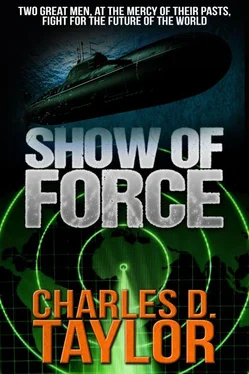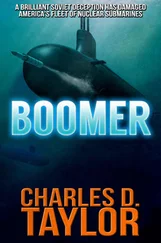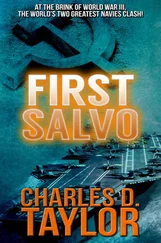The sounds of the pilothouse hadn't changed. The reports were still coming in and were being barked out by talkers or written down in grease pencil by listeners. The sailor on the helm had found that the wheel was easier now at low speed. No more water was entering forward, and the reports coming to the bridge even indicated they were having luck with the pumps. The fire aft was under control, though it still appeared a conflagration to the inexperienced eye. In time they would be able to take aboard the helicopters, and perhaps even shortly be able to recover the Tomcats, although somewhat more slowly than usual.
"My God, look at those little mothers." The lookout, now sandwiched between the Admiral and the captain, was sure he hadn't heard right, but he kept his binoculars to his eyes, watching the high-speed approach.
"Right, high speed, most likely gas turbine, and… yup, I can see torpedo tubes, too."
"And rocket launchers on the decks."
David looked up at the sky. "Where the hell are those jets?"
"You just called."
"They were supposed to be circling… waiting to land."
"Hell, they can't have much left in the way of ammo."
"Just their guns. That's all… expended on the rest of those Rigas."
"This is when I wish we had guns again, lots of 'em. Twenty mm. forty mm. Three inch."
"It wouldn't do much good against those torpedoes."
"Nope, but that's what we've got to hope the jets screw up. I'd like to have guns to keep them from firing those damn rockets."
"Yeah, you're right."
The lookout hadn't said a word. But, he'd been listening and he was getting scared. His voice trembled. "What can we do about them?"
"Nothing." They both said the one word simultaneously.
"We just have to hope those Tomcats get here double quick," added Welles.
"Hard to tell their speed at this distance, Frank, but I'll bet they must be upwards of seventy knots."
"You're probably right, Admiral, but without a bow wave it sure is deceptive as hell." They had both dropped their binoculars to talk. "Give them three or four minutes at the most if they want a good shot, less if they try to keep their distance."
"Sir," the sailor declared, "they're spreading out."
"They sure are. Makes tougher shooting for us." David paused and turned to the young sailor. "What's your name, son?"
"Meehan, sir, Edward L., Seaman Apprentice, sir."
"That's all right, Meehan, relax. You're doing a fine job. Like the Navy?"
Without a moment's hesitation: "No, sir. Not now!"
"Good for you. Neither do I right now. It could be bad for your health. But don't worry. I've been in worse scrapes before, and I still look pretty good, don't I?"
"Yes, sir."
"Well, I'm glad you're in agreement. My wife would be upset if you didn't. Keep a close eye out for the enemy up here. I want to stay healthy too. You and I got to keep an eye out for each other. Right?"
"Certainly, sir."
"Good. We all have to do that. Why don't you just pass the word over that phone set of yours. Make sure the people on the other end get it on the other circuits too."
Meehan was staring back at him, binoculars in both hands at about chest level, mouth slightly open, questioningly, the phone strapped around his neck with the speaker jutting out under his chin.
"Go ahead, Meehan. You tell 'em that. I'll handle your sector here for a moment." And David brought his own binoculars to his eyes, scanning the area where the attacking boats were crossing. The amazed lookout had finally let his binoculars swing free on his chest and was now speaking rapidly into the phone, convincing others of his conversation with the Admiral. David saw the newfound trust in the young eyes.
As wise seamen would, the captains of each of the small boats were opening the distance between themselves. Their orders had been to provide as little opportunity as possible for surface ships or aircraft to get more than one of them at a time. They were all volunteers. Before the force had left the Maldives, Admiral Kupinsky had called a meeting of the entire squadron. He explained their mission and the chances of survival. It was a suicide mission, and he wanted to make that quite clear. When he asked for volunteers, the entire squadron had stood as one, as their fathers had at Stalingrad when their backs were to the Volga, or at Leningrad, Moscow, Kursk, Odessa, Sevastopol, Tallinn or any number of places where Russians had casually accepted death in battle for the Motherland.
Four Tomcats screamed out of the sky overhead, diving on the small craft, Gatling-type guns chattering. There were no missiles or rockets left, only 20-mm. shells. But their guns spewed a curtain of large bullets that would tear apart any small vessel. The pilots found that the trick was to hit these water bugs.
A surface-effect ship rides on air. It lifts out of the water. There is no drag. This allows it tremendous speed over water and it can turn on a dime. The first pass by the jets was totally unsuccessful. The Soviet craft easily evaded them, refusing to stay in one place.
On the second pass the pilots came in from behind rather than from the beam. This allowed more time to watch what the Russian craft were going to do, and they had a better chance to follow their own stream of fire up to their target. One of the pilots noted that the craft he was closing was too consistent in weaving from right to left. When he opened fire, he let the boat slew left. When it came back to the right, it fell right in his path. The 20-mm. guns began to rip it apart from the stern, tossing boat parts and men into the air as shells raced toward the small pilothouse. Flames broke out aft as the pilothouse and men in it were shattered. Then the torpedoes were hit and the boat simply blew up. The highly explosive fuel for the gas turbines had gone off at the same time.
"They're not even firing back at those Tomcats," said Welles.
"I imagine their mission is to get here the quickest way and not to worry about anything that might slow them down. We're the target. Any chance of putting helos up?"
"Not a one. They're either being refueled and rearmed, or they were shot down covering the subs."
"Look at that," whistled the lookout between them.
One of the jets was about to bracket a Soviet boat when it whipped around in a tight turn, going right under the Tomcat, then returning to its original course. There were still five of them. At about four thousand yards, two of them opened up with rockets while the others circled toward either end of the carrier, maintaining their distance as they sought to position themselves on the opposite beam. The rockets were like peashooters to the large carrier, yet their effectiveness cleared the deck as they found the range.
At fifteen hundred yards, the closest one fired its first torpedo. The boat did not turn away, but followed its fish directly toward Nimitz. The second one also fired a torpedo at the same distance as the first. Of the remaining three, one raced farther past to attack from the other side, while the other two bore in from bow and stern, waiting to see if Nimitz would turn to avoid the torpedoes. At one thousand yards, the firing boats put their second fish in the water. Welles had run to the pilothouse door and was vainly giving orders to the helm, knowing she would not begin to turn before they were hit.
The Soviet boat that had swung astern of Nimitz was hit in the same way as the first. It was so loaded with ammunition and fuel that it exploded under the concentrated 20-mm. fire.
The first two boats still followed their own fish, firing the rockets as they closed. The first torpedo exploded no more than fifty feet from the earlier one, buckling all the bulkheads that had been depended on to hold back the hullful of water, washing over the damage-control parties that had been working desperately to hold back.the sea. The second one hit just under the bridge. The third exploded near the stern. A fourth miraculously dove under the ship.
Читать дальше












